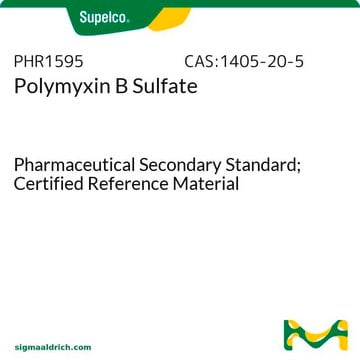P1004
Polymyxin B sulfate salt
Synonym(s):
Polymixin, Polymixin B, Polymixin B sulfate
About This Item
Recommended Products
biological source
Pseudomonas aeruginosa
Quality Level
form
powder
storage condition
(Tightly closed. Dry. )
solubility
water: 50 mg/mL
antibiotic activity spectrum
Gram-negative bacteria
fungi
Mode of action
cell membrane | interferes
storage temp.
2-8°C
SMILES string
O=C(C(NC(C(CCN)NC(CCCCC(C)CC)=O)=O)C(C)O)NC(CCN)C(NC(CCNC(C(NC(C(NC(C(CCN)N1)=O)CCN)=O)C(O)C)=O)C(NC(CCN)C(NC(CC2=CC=CC=C2)C(NC(CC(C)C)C1=O)=O)=O)=O)=O.O=S(O)(O)=O
InChI
1S/C48H82N16O13.H2O4S/c1-27(2)24-37-47(76)59-32(11-19-52)41(70)56-31(10-18-51)43(72)61-35(14-22-65)39(68)54-21-13-34(45(74)57-33(12-20-53)44(73)64-38(48(77)63-37)25-28-6-4-3-5-7-28)60-42(71)30(9-17-50)58-46(75)36(15-23-66)62-40(69)29(8-16-49)55-26-67;1-5(2,3)4/h3-7,26-27,29-38,65-66H,8-25,49-53H2,1-2H3,(H,54,68)(H,55,67)(H,56,70)(H,57,74)(H,58,75)(H,59,76)(H,60,71)(H,61,72)(H,62,69)(H,63,77)(H,64,73);(H2,1,2,3,4)
InChI key
HNDFYNOVSOOGDU-UHFFFAOYSA-N
Looking for similar products? Visit Product Comparison Guide
General description
Application
- in human aortic endothelial cells (HAEC) cell culture to exclude potential endotoxin contamination in recombinant adiponectin
- in the analysis of the isolates
- in endotoxin-neutralizing activity of α-amylase (AmyI-1)-18 (LAL assay)
Biochem/physiol Actions
Antimicrobial spectrum: Has bactericidal action on most gram-negative bacilli††, including E. Coli and on most fungi and gram-positive bacteria.
Features and Benefits
Preparation Note
Stock solutions should be sterile filtered and stored at 2-8°C. They are stable at 37°C for 5 days.
Storage and Stability
Other Notes
Signal Word
Warning
Hazard Statements
Precautionary Statements
Hazard Classifications
Acute Tox. 4 Oral
Storage Class Code
11 - Combustible Solids
WGK
WGK 3
Flash Point(F)
Not applicable
Flash Point(C)
Not applicable
Personal Protective Equipment
Choose from one of the most recent versions:
Certificates of Analysis (COA)
Don't see the Right Version?
If you require a particular version, you can look up a specific certificate by the Lot or Batch number.
Already Own This Product?
Find documentation for the products that you have recently purchased in the Document Library.
Customers Also Viewed
Our team of scientists has experience in all areas of research including Life Science, Material Science, Chemical Synthesis, Chromatography, Analytical and many others.
Contact Technical Service







